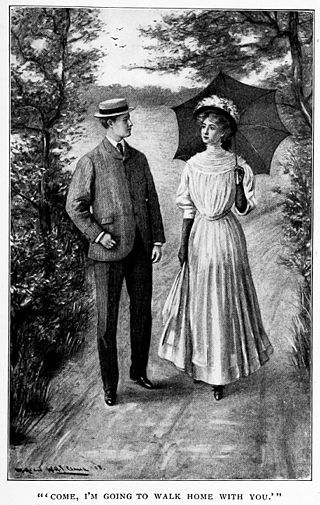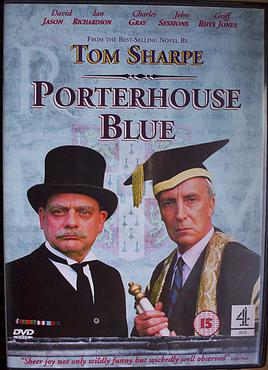
The Unseen University (UU) is a school of wizardry in Terry Pratchett's Discworld series of fantasy novels. Located in the fictional city of Ankh-Morpork, the UU is staffed by a faculty composed of mostly indolent and inept old wizards. The university's name is a pun on the Invisible College, and many aspects of the university are references to Oxford and Cambridge University. The exploits of the head wizards of the Unseen University are one of the main plot threads in the long-running fantasy series, and have played a central role in 13 novels to date, as well as the four supplementary Science of Discworld novels and the short story, A Collegiate Casting-Out of Devilish Devices.
Sir John Kenneth Tavener was an English composer, known for his extensive output of choral religious works. Among his best known works are The Lamb (1982), The Protecting Veil (1988), and Song for Athene (1993).

Corpus Christi College, is a constituent college of the University of Cambridge. From the late 14th century through to the early 19th century it was also commonly known as St Benet's College.

Trevor David Pinnock is a British harpsichordist and conductor.

Grantchester Grind is a novel written by Tom Sharpe, a British novelist born in 1928 who was educated at Lancing College and then at Pembroke College, Cambridge.

Anne of the Island is the third book in the Anne of Green Gables series, written by Lucy Maud Montgomery about Anne Shirley. Anne Of the Island is the third book of the eight-book sequels written by L. M. Montgomery, about Anne Shirley and her friends. In the book, Anne leaves Green Gables for the first time to go to Redmond College to get a bachelor's degree in art at the age of 18.

Gilbert Blythe is a character in Lucy Maud Montgomery's Anne of Green Gables series of novels.

Zak Ramsey is a fictional character on the British Channel 4 soap opera Hollyoaks, played by Kent Riley. Zak first appeared in 2004, when he was credited as 'Zak Barnes'. After only four months, Riley was dropped from the programme. The character received a revival 18 months later however when producer Bryan Kirkwood brought him back in 2006. Following the arrival of producer Paul Marquess in January 2010, the series underwent a major overhaul and as part of a large cast cull, it was announced that the character had been axed from the series for a second time on 6th August 2010, replaced by a new character, Brendan Brady.

Green Templeton College (GTC) is a constituent college of the University of Oxford in the United Kingdom. The college is located on the former Green College site on Woodstock Road next to the Radcliffe Observatory Quarter in North Oxford and is centred on the architecturally important Radcliffe Observatory, an 18th-century building, modelled on the ancient Tower of the Winds at Athens. It is the university's second newest graduate college, after Reuben College, having been founded by the historic merger of Green College and Templeton College in 2008.

Skullion is a central character in Porterhouse Blue (1974) and Grantchester Grind (1995), two novels about life in the fictitious Porterhouse College at Cambridge by British novelist Tom Sharpe. For centuries, Porterhouse College has been renowned for its cuisine, the prowess of its rowers and the low level of its academic achievements. Since the college was founded there have been Skullions at Porterhouse.

Augustus "Gus" Haynes is a fictional character on the HBO drama The Wire, played by actor Clark Johnson, who is also a director for the series. Haynes is the dedicated and principled editor for The Baltimore Sun city desk.
Robert Mapletoft was an English churchman and academic, Master of Pembroke College, Cambridge and Dean of Ely.
John Rouse Bloxam (1807–1891) was an English academic and clergyman, the historian of Magdalen College, Oxford.

William Cooke (1711–1797) was an English cleric and academic, Provost of King's College, Cambridge from 1772 and Dean of Ely from 1780.
John Edward Jeuck was an American professor of business and dean (1952–1955) of the University of Chicago Booth School of Business. He was best known for his work on business history and corporate strategy, especially his profile of Sears in his 1950 book Catalogues and Counters: A History of Sears, Roebuck and Company with Boris Emmet. The book received the national award of the American Marketing Association in 1951.
Adam Squire or Squier was an English churchman and academic, Master of Balliol College, Oxford, from 1571 to 1580, and Archdeacon of Middlesex from 1577.

James Halman was an academic of the University of Cambridge. He held the office of Registrary of the university from 1683 to 1701 and was also the twenty-third Master of Gonville and Caius College.
Robert "Bob" Scott born in 1946 is an American businessman currently living in Naples, Florida. He formerly served as the President and chief operating officer of Morgan Stanley. He was part of the famous Wall Street "Gang of Eight" involved in the ousting of former Morgan Stanley CEO Philip J. Purcell. He continues to work in business and is a member of many corporate boards as well as a board member of various philanthropic organizations.

Porterhouse Blue is a 1987 television comedy series adapted by Malcolm Bradbury from the 1974 Tom Sharpe novel of the same name for Channel 4 in four episodes. It starred David Jason as Skullion, Ian Richardson as Sir Godber Evans, Barbara Jefford as his wife Lady Mary, Charles Gray as Sir Cathcart D'Eath, and John Sessions as Zipser. Also appearing were Griff Rhys Jones as Cornelius Carrington, Paula Jacobs as Mrs. Biggs, Bob Goody as Walter, Paul Rogers as the Dean, John Woodnutt as the Senior Tutor, Lockwood West as the Chaplain, Willoughby Goddard as Professor Siblington, Harold Innocent as the Bursar and Ian Wallace as the Praelector.

William Charles Utermohlen was an American figurative artist known for his late-period self-portraits completed after his 1995 diagnosis of probable Alzheimer's disease. He had developed progressive memory loss beginning about four years before his diagnosis in 1995, and during that time began a series of self-portraits influenced in part by the figurative painter Francis Bacon and cinematographers from the movement of German Expressionism.